The sensed information is collected from event-based sensors and other devices that are communicated among devices forming a wireless sensor network or WSN. Sensor nodes form gateway and pathway in data transmission through WSN respectively. At Wireless Sensor Network Projects, network topology, protocols, simulation tools, implementation procedure, algorithms, and processes for energy consumption issues are clearly illustrated. Below is a brief idea about research-related aspects of wireless sensor networks (WSN).
Limitations of WSN
Doing research is a way of contributing to the research world. So rectifying the existing problems is the key to starting any research. Following are the existing limitations in wireless sensor networks.
- Batteries in WSN play a significant role. But they have limited lifetime
- Extensive power consumption in WSN communication over a short distance
- The ability to store data is very less
- Less energy is provided by passive components
- Minimum energy requirement affects the protocol used
- Lack of secure communication
From us, you can find customized research guidance with practical explanations on all basic and advanced knowledge required for your research. From the experience that we gained in guiding research scholars across the world, we provide the most trusted online research assistance for wireless sensor network projects. Our well-experienced and highly qualified team of engineers arrives at solutions to any problems. You can therefore totally rely on us for your research support. Knowing the challenges that you will face in your journey is a prerequisite for research. So we have provided those issues below.
Research Challenges in WSN
Following are certain challenges in WSN research.
- Redundancy in data decreases its authenticity and robustness. Aggregation and fusion of data help to reduce redundancy while complicating the WSN architecture.
- Expandability of WSN i.e. it should accommodate all the sensors.
- Prioritizing technical information requires differentiation among protocols.
- Traffic must be balanced with a check on the quality.
- Controlling power efficiency may lead to system failures and make WSN complex.
- Priorities of various sinks must be supported by WSN.
- Different sensor types employed in the WSN complicate its structure.
- A balanced distribution of energy across all sensors increase the life of the network
- Recharging sensor batteries in remote areas is the primary concern on resource availability.
To overcome these challenges you require reliable guidance in your research career. We at Wireless Sensor Network Projects are happy to render full support in your research. As evidence of our pure support, we provide you with PhD topics in WSN here.
PhD Topics in Wireless Sensor Networks
Following is the list of research topics in sensor networks.
- IoT supported sensors in large scale industries
- Automation in industries using sensors extensively and judiciously
- IoT-based sensor networks for moving systems.
- Accurate measurements using IoT sensors
- Cloud supported system of sensors
- Soft, virtual, and IoT-aided industrial sensors.
These are the major areas of threshold that you can choose to do research in WSN. We have delivered 5000 research support in WSN and wireless across colleges and universities from around 190 countries in the world. With that huge experience, we provide below the analysis of performance in WSN.
Performance Analysis in WSN
Characteristics of simulation are picked out on the basis of required output. For this purpose, certain assumptions are made before simulation. They are listed below.
- Size of the data packet
- Distribution of nodes
- Positioning the BS
- The energy level of sensor node
- Range of communications
After completion of the simulation, the assessment of the performance of the system is carried out based on the following metrics.
Quality of Service (QoS) Metrics in WSN
- Rate of data delivery
- Inactive nodes in each round
- The ratio of packet delivery
- Throughput in the network
Hope you are satisfied to do research in WSN. We are here to provide you with the most reliable, scam-free, professional Wireless Sensor Network Projects. We also support research in novel ideas in any field. So you can contact us at any time to kick start your research journey enthusiastically.

